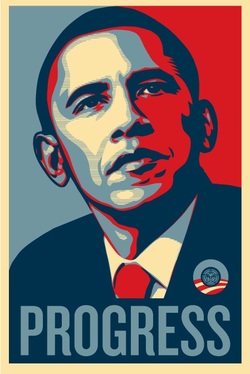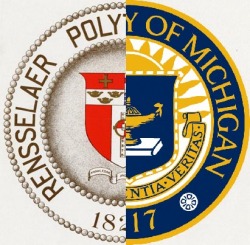Almost two years ago when President Obama took office, he probably had no idea what it was exactly he was inheriting. While I personally didn't vote (I was somewhat confused as to where I stood politics-wise), if I had I would have cast my vote in his favor. He was (and is) young, energetic, an excellent speaker and natural leader, and a face that we could all rally around.
But what I did also notice was the ridiculous hoopla that his reputation had garnered. People (especially in Ann Arbor) had him pegged as the savior, the one who would change everything, a superman hiding among us only to now come forward to lead us to peace and happiness.
While a supporter of our current president, I expressed mild frustration at this spirit. Although our president is a very smart man, and very capable of leading our country, he is still human in all respects. He can't change everything instantaneously, he's going to make mistakes, he's going to anger and seemingly betray those who once held him in high-esteem.
So I thought the best way I could support Pres. Obama was to remind people of this fact, lest they be disappointed following election day, where they went to bed with God and woke up with a human instead. I just hoped that people who worshipped Pres. Obama would eventually realize that he's imperfect as the rest of us, and only capable of so much.
Once that is understood, we can really get to work, and let the President get to his work as well. I'm sure he's a very busy man, just like you and I. My bosses don't expect perfection out of me. Perhaps we shouldn't expect it out of him. After all, he is, at least in spirit, in our employ.
So I was thinking about the nature of the research I'd like to do over the next few years (however long it takes for me to accomplish what it is I want to accomplish at the graduate student level, be it three or four or five years), and my mind turned to the way language functions between humans (as my thoughts tend to these days). A very simple way for me to break down language was by dividing it into three components:
1. Syntax
2. Semantics
3. Pragmatics
This list is akin to the field of Semiotics, "the study of sign processes (semiosis), or signification and communication, signs and symbols (Wikipedia)."
In short, these three components all combine in a way to enable communication via the use of symbols and signs, and the meaning that these symbols and signs signify. I will need to flesh out these ideas more, but I am curious about what theories of these interactions exist to represent meaning in natural language. Perhaps an implementation of my own theory on Natural Language Semiotics in the cognitive architecture Polyscheme may be in order at some point in the near future...
This seemingly simple question actually poses quite a quandary to me. Think about it for a moment. How would you personally define a word?
1. A sound
2. A segment of speech/written language that carries meaning
3. That annoying thing that fills the pages of those things we never open
One thing that we can generally agree on is that words do carry meaning. After all, if words had no meanings, things like dictionary's would be...well, useless to us. Not to mention, the word's I'm writing at this very moment would be of little use to you, the reader (on a side note, isn't it a curious difficulty for us who work with words that we've tended to use words to understand words, such as syntax, semantics, grammar, lexicon, etc..., but those are all issues for another time and day).
So in a way, word's function a little bit like symbols, symbols that represent infinite meaning and depth, and yet are manipulated for the most part with ease and fluidity. Sort of like juggling chainsaws as though they were tennis balls.
All courtesy of Matt Might. 1. A graphical representation of the PhD student's life: http://matt.might.net/articles/phd-school-in-pictures/This illustrates to me just how hard it is to make one's life's work meaningful to those not already acquainted in the field. What means the world to us is largely irrelevant to the vast majority of observers. Depressing? Perhaps, but it's also motivation to keep going, and also try to make your work as understandable as possible to as many people as possible. 2. Three important qualities for the successful graduate student: http://matt.might.net/articles/successful-phd-students/The fact that you don't have to be smart to do a PhD certainly works in my favor. I've never been the brightest or the best, never stood out incredibly among my peers for the brilliance of my analysis or study. Of note to me was an occasion where my philosophy professor outright said to my face "Richard, your grades are mediocre." Not the most positive message to take home. Fortunately though, what I do have is determination, and grit. I hope that can carry me through. That and I'm very familiar with failure. ...I'm starting to get the impression that becoming depressed about one's previous life is a good way to start graduate school.
I do wonder sometimes whether there is something scientific in the way some people have learned to control their emotions, thoughts, and feelings. Through a variety of means and differing practices, people around the world in various times have discovered and implemented ways of controlling the way things flow in, out, grow, fester, develop, or deteriorate in their mind.
It truly is a fascinating ability, and one that would be well served to consider adding to one's own repertoire of skills and practices. After all, who here doesn't want the ability to control their very thoughts, to filter what needs to be considered at a particular time, to control the way the mind tosses and turns things like a restless sleeper?
Let's meditate on that.
Well, that's one heck of a mouthful for a title. Let me explain it.
It's been theorized that the foundations for human language use are based on concepts that are intrinsically non-linguistic. That is to say, the basis of language is not on the words uttered, written, or otherwise conveyed in some manner (although this being an integral part of language as we experience and know it), but rather on the words' reference to processes, states, and other abstract concepts concerning extra-linguistic information, where the word attachment to the experience is arbitrary (it could have just as easily developed in the English language that the label "dog" be attached to a motorized vehicle intended for personal transportation, a.k.a. what we call a "car" for instance).
That being said, let us consider the combinatoric nature of natural language syntax and its relation to a canonical form of meaning:
1. "I ate the bagel."
2. "The bagel was eaten by me."
3. "At some point in the past, I consumed a bagel."
4. * "I ate bagel."
... and so on and so forth.
note: "*" means sentence is ill-formed
Examining these sentences, you can see they are all different in one sense, yet identical in another. They are different in that they use different words and in different order. Sentence (4) is not even well-formed as a sentence, yet it is understandable to us native and/or relatively fluid speakers of English what the intended meaning of (4) is.
At the same time, they are identical in the way that pragmatically, they all mean the same thing. Something like:
<tense=past>
<action=eat>
<subject=me>
<directObject=bagel>
That is to say, there is a single canonical form to which all of the above sentences refer to simultaneously. All of the sentences, with all of their lexical and syntactic differences accounted for, still mean essentially the same thing: Before the time of the utterance, I ate a bagel.
Thus, we can see that even with differences in syntactic structure between sentences, they can still mean the same thing. This point I hope is beyond debate, as the previous examples should suffice to convince you of its truth (I hope...).
Here's where the water gets murkier. I will in the next few posts argue shortly for a minimized set of native non-linguistic concepts that can account for the canonical form of sentences that is not wholly defined by syntactic and lexical structure in natural language use. Then I will consider possible forms this set of native non-linguistic concepts that is the base of human natural language understanding through the yielded canonical form representation. Once we have postulated a method of representing the canonical form of natural language, I will then consider the form of a possible interface that exists between the syntactic and lexical composition of a natural language utterance or set of utterances (for instance in dialogue and discourse).
What this hopefully should yield is the beginning of a research goal for the future, where I can continue to explore the nature of the syntax-semantics interface with an eye towards:
1. Natural language origins
2. Natural language use
3. Cognitive underpinnings of natural language understanding
Kind of a big question, huh.
Keep in touch.
Soon enough, the wait will be over, I can finally begin my graduate studies at RPI.
Although I sometimes feel anything but prepared, there really isn't much time for doubt or fear to leak into my mind.
Soon enough, I'll be running in directions I've never been. It will be difficult, challenging, arduous, <insert synonym for difficult here>. Within a few days, I will be far away, fighting my way for something great and worthwhile.
I have many goals out there I want to accomplish in my time with Prof. Cassimatis' HLI lab, and I intend to get running as soon as possible. Among the goals involved are making a meaningful contribution to the lab and the general body of knowledge in the field of cognitive science (how's that for a sound bite?), making a good impression on those who are relevant to my future, and perhaps shooting for finishing my PhD in 3-3.5 years. As tough as that last point seems at first glance, I know that it's possible (it's mathematically possible on paper, and it's been done by others before). It's possible if I go in with a plan, focus, and consistency.
The run to the PhD is not a sprint, but a marathon. Hopefully I can run it in pretty near record time, and still enjoy some of the scenery along the way.
Wish me luck!
There are many things changing now in my life. Currently, I've been feeling a more personal nature has walked its way into my posts. As the world to swirl and burn around, we cling to the things we have, and fear losing them more than anything else.
Have I made a mistake?
It's too late now to think about it.
Sometimes, you've just gotta keep going...
|



 RSS Feed
RSS Feed